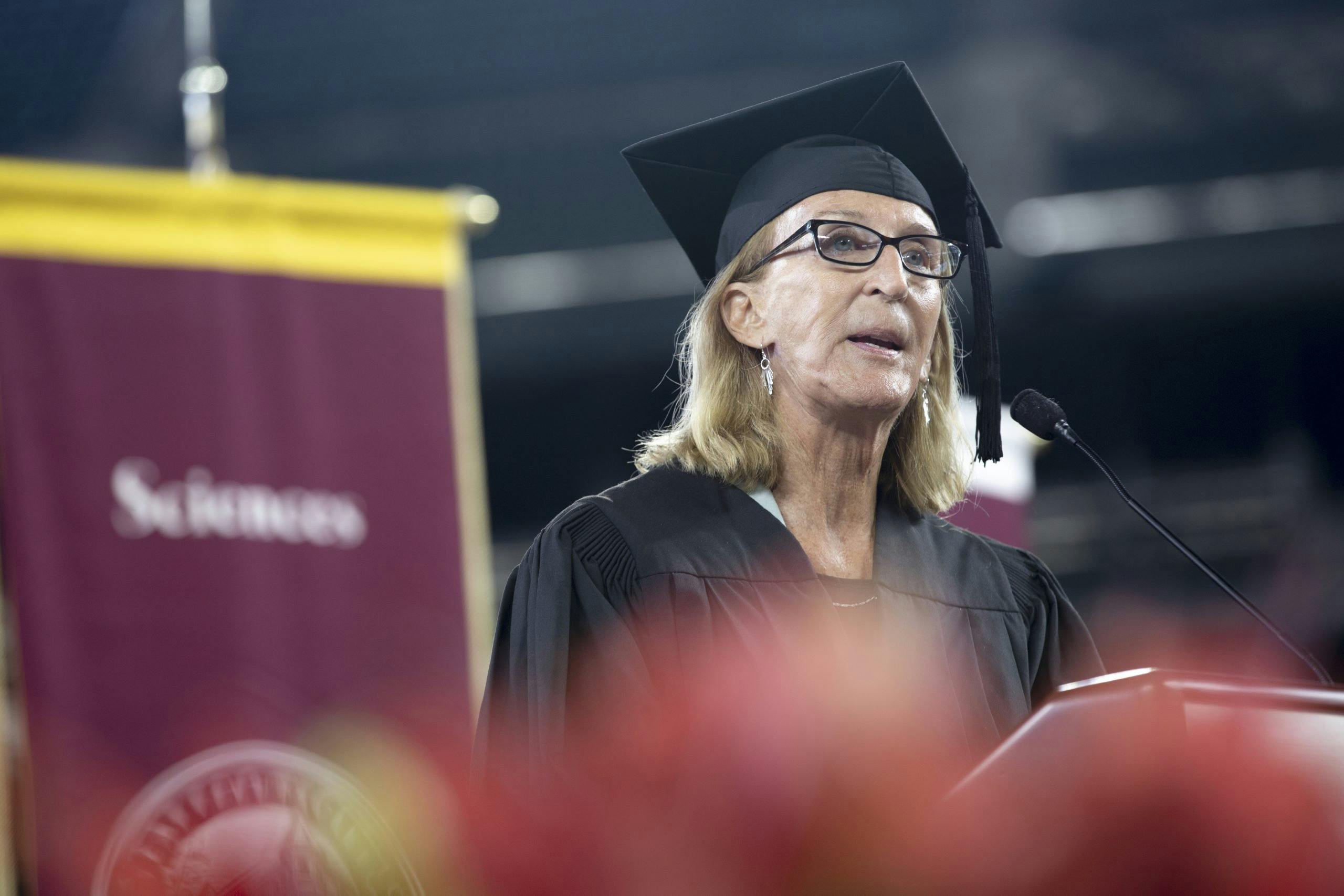Phyllis Sortor ’64 was honored as Seattle Pacific’s Alumna of the Year for a life spent proclaiming Jesus.
Thirty-two years after Victor Macy ’32 graduated from Seattle Pacific College, his daughter, Phyllis Sortor ’64, also graduated from her father’s alma mater. Generations of families graduating from Seattle Pacific isn’t remarkable by itself, but Macy and Sortor are the first father/daughter alumni to be given Seattle Pacific’s Alumnus/Alumna of the Year award. Sortor watched her father receive the award in 1962. This year, she was honored as SPU’s Alumna of the Year.
Macy served as a missionary in Africa for 43 years before he died in 2012. “My father was a missionary statesman,” Sortor explained in a recent SPU Voices Podcast. “[He] never wavered from the right or the left. He was a devoted father and husband to my mom. He was a great man.” When Macy earned his pilot’s license at age 60, First Free Methodist Church raised money and bought him a Cessna two-seater plane. Later, the church helped him purchase a four-seater plane, which he used to fly all over Africa, performing maintenance on the planes himself.
Sortor, who was also this year’s Undergraduate Commencement speaker, is deeply grateful to her alma mater. “SPC has done so much for me,” she said.
Born in Mozambique, Sortor has spent most of her life in Africa. “I came to SPC as a 16-year-old straight out of the bush,” she recounted. “I was terrified. But when I got [to Seattle Pacific] people were so kind, and everything was OK.”
Sortor graduated from SPC at age 20 with a degree in French and immediately got a job teaching high school French. “I had some kids in my class who were nearly my age,” she quipped, “but we got along fine. We had a good time.”
Sortor’s career as a French teacher was short-lived, however, as she soon answered the call to be a missionary in Nigeria. For decades, she devoted herself to serving the Fulani tribespeople. She founded Schools for Africa, which advocates for education and quality healthcare for the Fulani people, and a peaceful way to continue their culture of raising cattle.
Then, in 2015, Sortor was kidnapped and held for ransom for 12 grueling and harrowing days. Her captors repeatedly told her she was going to die. After her God-orchestrated release, she moved to Seattle to recover from the horrifying ordeal.
Astonishingly, she soon returned to Nigeria, the very place where she had been kidnapped. Today, she continues to serve the Fulani there. Schools for Africa has built 19 primary schools where Muslim and Christian children learn and play side by side, and six healthcare clinics.
Sortor regards her kidnapping as a spiritual battle from beginning to end — one that brought on a near crisis of faith for her, as she explained in her book Kidnapped Redemption. Ultimately, though, she views her kidnapping and ransom as a metaphor for how Satan has kidnapped humankind, and Jesus paid the ransom on the cross to purchase everyone’s freedom.
“Until somebody is actually kidnapped, they won’t ever realize how precious is that ransom,” Sortor explained. “It’s your life. And it’s the same with sinners. We just don’t realize it. And that’s the message we really need to get across to people.”
Sortor has been living out the gospel with her life. “You can get the message out not just by preaching the gospel with a Bible in your hand, but by showing that kind of love and care.” Sortor has many Muslims on her direct team. “When we’re sitting in the car driving for hours on end, I share all kinds of stories. God gives me opportunities to give testimony on ‘this happened, and this happened,’ when it was only God who could have done it. And I trust God that he will take whatever message, whatever testimony, whatever loving deed, and use it to bring people to himself. He’s quite capable of that.”
 In her Undergraduate Commencement speech for SPU in June, Sortor talked about how she has responded to God’s call on her life and encouraged students to ask themselves some critical questions: “How is God shaping you for the specific purpose he has for your life?” she asked. “Will you trust him with your whole lifetime and live for God’s purposes? Will you let him take all of who you are — your past, present and future; your abilities, your strengths and weaknesses — and use them to achieve his purposes?”
In her Undergraduate Commencement speech for SPU in June, Sortor talked about how she has responded to God’s call on her life and encouraged students to ask themselves some critical questions: “How is God shaping you for the specific purpose he has for your life?” she asked. “Will you trust him with your whole lifetime and live for God’s purposes? Will you let him take all of who you are — your past, present and future; your abilities, your strengths and weaknesses — and use them to achieve his purposes?”
Sortor is certain God called her to Nigeria, both before and after her kidnapping. The call meant less time than she would have liked to spend with her own children and grandchildren, but Sortor says, “I just have to trust God with them. And the way he’s helping and favoring and blessing our work makes me know that he’s the one in charge. And if I can trust myself to him, I can trust my children to him. All that truly counts is proclaiming Jesus.”




